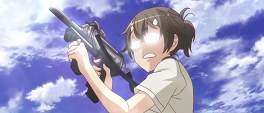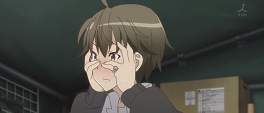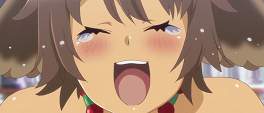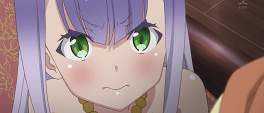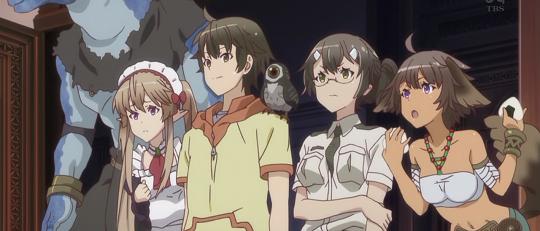On paper Outbreak Company is, frankly, bobbins. An otaku is transported to a fantasy realm of elven maids, busty werewolves and a pint-sized queen in order to spread the otaku way to them. But of course paper is exactly where it started with a series of ongoing light novels and manga preceding the twelve episode anime which is not only funny in a dorky, self-aware kind of way but also surprisingly sensitive to the panoply of topics it touched upon.
The first it tackles is cultural imperialism: the male protagonist Shinichi, and by extension Japan through his, what else, busty BL-loving JSDF aide, are shown to be sensitive to steamrollering their ideals and morals on the populace of the fantasy realm of Eldant. This creates some oddly atypical situations such as when the diminutive queen verbally and almost physically attacks the lead half-elf maid, a situation defused not by posturing and proselytising but by a measure of understanding. From a western point of view this very pointed approach to diplomacy could be taken as a dig towards the jingoism of real-world recent conflicts and occupations but is more likely aimed inward and towards Japan’s recent past.
Certainly the series shows a distinct lack of trust towards authority, specifically any and all government officials. Slippery and power hungry, it is through the power of the otaku way that the plucky ex-hikkikomori Shinichi is able to best them. This isn’t an exaggeration: a love of anime, manga, games and all points in-between is shown to let previously bickering races be tolerant of one another, introduce temperance and empathy to a regent, and generally be the panacea to social problems.
That is of course until Shinichi’s hikkikomori ways rub off on the queen, Petrarca - who has of course taken a special liking to the male lead. Once again, what could have been a whitewash of a growing and little understood psychological problem is treated with sympathy and a measure of delicacy; the emotional trauma that accompanies the infliction isn’t skimped upon, despite an otherwise light-hearted comedy structure. Of course since before Welcome to the N.H.K. was born, hikkikomori syndrome and otaku status have been conflated despite real-world evidence to the contrary, here it is no different but still pleasingly perceptive.
It is a perception that follows through to the series’ reverential treatment of otaku culture which is as deferential as something like Genshiken with just as much self-knowing as to where such adherents stand within society’s hierarchy. There is the regular nod to franchises past and future as well digs at the director for past indiscretions. Unlike Genshiken however, there is no attempt to differentiate the more lascivious elements of fandom from the ostensibly “purer” excitement, for instance, over models or new releases. This goes as far as teaching the concept of a “top” and “bottom” (seme and uke) from boys’ love parlance to a classroom full of nine and ten year olds.
It feels wrong, regardless of the species (elves and dwarves) difference and in-world explanation for it, but is indicative of how tawdriness is treated in the series as a whole. Shinichi can go from enumerating the qualities of one of the female cast member’s breasts to talking about his soon-to-be open school without any kind of push-back. Refreshing that it’s not the standard “kyaa! pervert!” response that is usually trotted out but some kind of indicator that it isn’t gentlemanly behaviour would be welcome. Of course for a light-comedy serial it works and the smuttiness is never overused, and in many cases is poked fun at, for example with the wonderfully self-conscious water splashing scene in the beach episode.
Comedy is the overriding rule though, unlike its closest contemporary Zero no Tsukaima that features a startlingly similar “dork makes good while trapped in a fantasy realm” story. It helps that Shinichi is far from the obnoxious and arrogant twit that otaku are usually portrayed as and with the passage of time during the show and the effort he puts in, such as it is, it’s hard not to be won over. This is quite aside from the glaring holes in the plot such as how Miusel, the demure and elf-eared maid, is able to be taught written Japanese without any existing frame of reference; ignoring of course the babel-fish style translation rings that are only remembered when it’s convenient and ignore cultural idiosyncrasies.
Regardless, the Outbreak Company anime is, when it needs to be, equal measures funny and sensitive while never forgetting that it is intensely silly. Those looking for more fantasy elements should look elsewhere as although the archetypes are all ticked off here, the giant flying fish and reptilian romance of the opening isn’t played out to any appreciable degree, and the different species that roam the world are instead used to pigeonhole the characters even quicker than they would be otherwise. Dorky and predictable but entertaining and, pleasingly, never irreverent.
